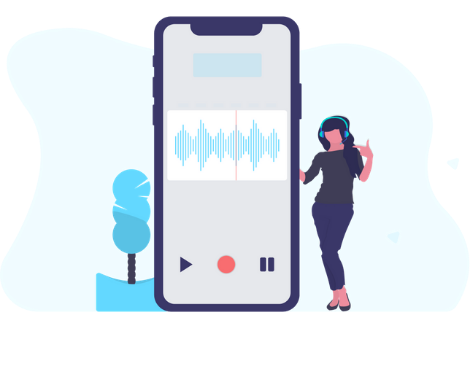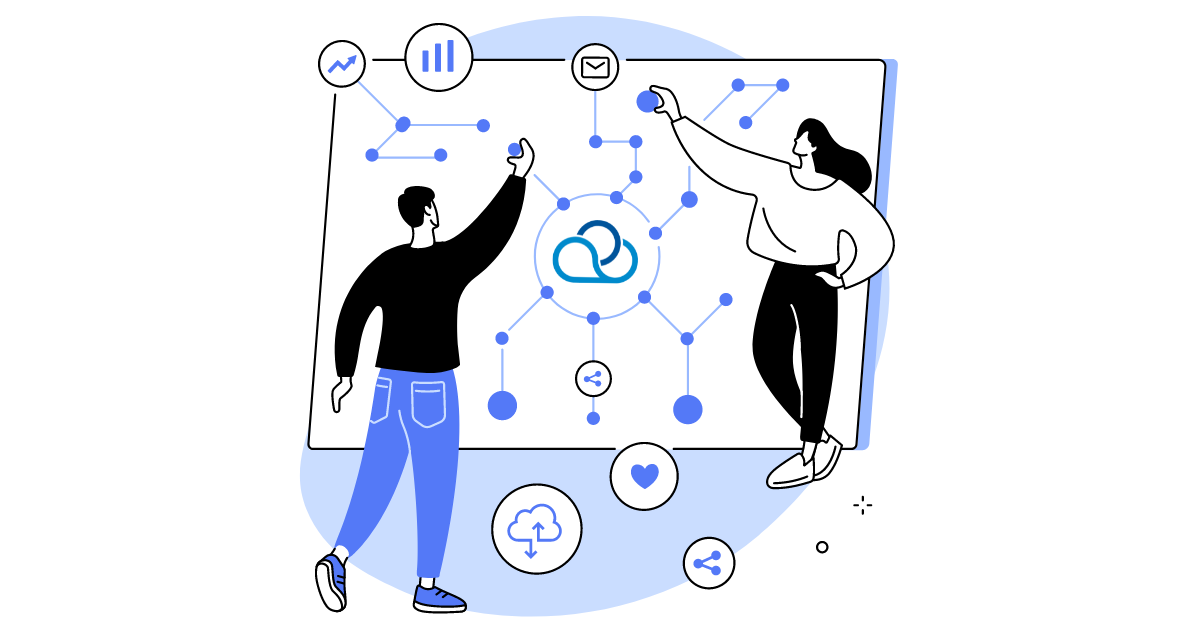An effective call center customer service training is an excellent way to support and develop relationships with customers. It plays a vital role in call center sales training, as well as in improving the quality of service.
To achieve success, you need a professional team that can interact with customers efficiently. It’s important to carefully approach the selection and training of call center agents, as well as to create an effective management system. This way, you can form a team that successfully copes with tasks and meets the needs of customers.
There are various ways to find good agents for a call center. Use online job search platforms, social networks, or specialized staffing agencies. It is also important to consider the conditions and specifics of the work your call center offers.
How to find “the one” agent?
Before you start looking for candidates, it is important to understand exactly which skills and qualities you need. For example, the ability to communicate is not just about talking, but making the customer feel heard. Stress resistance is also important: the customer may be dissatisfied, but the agent must remain calm and offer a solution, instead of panicking.
If a candidate has already worked with CRM systems and can quickly find the necessary information – that’s a big plus. And, of course, the desire to learn is a must. Situations change, technologies evolve, and the agent must be ready to grow along with the team.
Do not forget about personal qualities: adaptability is the ability to adjust at any moment. For example, one client may be in a hurry and want a quick response, while another needs detailed explanations. A good agent can guess the mood and adjust accordingly. The desire to help plays a significant role – the best agent is the one who sincerely tries to make the customer’s day a little better, even if someone on the other end of the line is annoyed or flustered.
The more precisely you define the requirements, the faster you’ll find the right person who can do the job with soul.
Unconventional interview questions
Choosing agents is not just about finding someone who can answer calls. You need to dig deeper to find those who will truly be effective in their work.
Use call center training ideas for developing your hiring process. For example, to understand how well they can express thoughts clearly and simply – ask them to write a short letter to a customer. Or ask them to describe a complex process as if explaining it to a child. This way, you will find out if the person can speak simply and clearly about complex things – exactly what is required from an agent.
During the interview, ask unexpected questions. This will help to see how the person thinks and copes with uncertainty. For example: “What would you do if a customer came up with a problem that cannot be solved immediately?” Such questions show how flexible and creative the candidate is, not just following templates.
Pay attention to how the candidate listens. Sometimes during an interview, a person tries too hard “to impress” and does not hear what exactly they are being asked. A good agent should be able to listen, not just talk.
An unconventional approach to selection will help you find those who not only cope with tasks but also do it with interest and attention to clients.
What to teach call center agents
To make an agent a master of their craft, the call center training program for working in a call center should cover all the necessary moments for successful work. This is not just theory, but skills that help deal with different clients and situations. This is where call center soft skills training will be essential to boost agents’ ability to effectively interact with customers.
Knowledge of the product or service
Agents need to understand not just “on the surface,” but so that they can easily and confidently talk about any details. Knowledge of the product is not about memorizing facts, but understanding how it helps the customer.
For example, if a customer calls to return a product, the agent should not just explain the return policy, but support the customer, offer alternatives – a product replacement or additional information that may help them reconsider.
If a customer is dissatisfied with the speed of delivery, the agent does not simply state the dry terms but adds personal attention: “I understand how this can be inconvenient. Let me check what can be done to speed up the process, okay?”
There are situations when an agent does not know what to answer to a customer. The main thing here – is not to be silent, otherwise, the customer may feel they are being ignored and not wanted to be helped. How to avoid silence in conversations with customers read on our blog. And ready-made responses to objections will help the agent work more confidently.
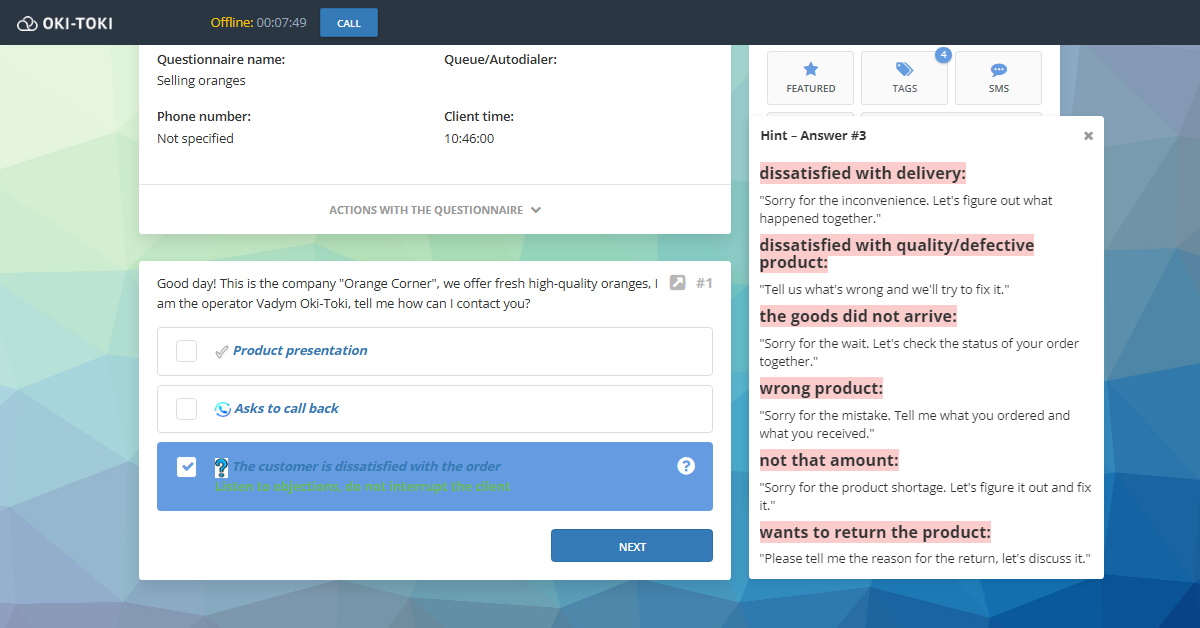
Adapting scripts
Scripts for call centers are just the foundation, and good agents know when to deviate from them. Sometimes a script does not fit a particular situation, and here, the ability to improvise is crucial.
For example, if a customer is irritated, and the script requires you to just continue the sale, the agent should take a step back and show more empathy: “I understand the situation is unpleasant, let’s find a solution together”.
One customer may be brief and ask for an immediate answer, while another may want to share more details. The agent needs to be able to feel this moment and switch to short answers or continue the conversation so the customer feels comfortable.
Listening skills — more than just “hearing”
Agents need to not only listen but also hear what remains “between the lines”. Correct listening is not just nodding while the customer speaks but asking clarifying questions to better understand the issue.
If a customer complains about a problem with the internet and mentions in passing that they don’t understand the router settings, a good agent doesn’t just resolve the network issue but also offers help with the settings. “I see you’re also having trouble with router settings. Let’s figure it out together, I’ll explain everything step by step right now”.
How to build trust with call center empathy training read in a separate article.
Dealing with objections without stress
Objections are part of the job and instead of fearing them, the agent should see them as an opportunity to help. For example, if a customer says the product is too expensive, the agent can not only offer a discount but also talk about the advantages that truly make the product worth it.
“I understand that the price may seem high, but this is because our equipment comes with a longer warranty and high reliability. Furthermore, I can tell you about the current promotions”.
About telemarketing and Oki-Toki tools read in a separate article.
How to stay calm in any situation
Stress resistance is not about “keeping everything inside”, but about not succumbing to the negativity of a client. Clients can be different, and it’s important that the agent doesn’t take rudeness personally. The best way is to redirect the conversation into a calm course, sometimes even using a bit of humor.
The customer starts being rude. Instead of responding with aggression, the agent might say: “I understand your dissatisfaction, let me try to make your day a bit better, let’s start by solving your problem, okay?”
How to approach confrontational customers and motivate an agent after an angry call read on the blog.
Using tools and systems
Technology — the best assistants for an agent, if used wisely. At Oki-Toki, agents work with a convenient platform that speeds up and simplifies their work. It’s essential to train agents not only on the system’s basic functions but also on useful tricks to handle tasks faster and better.
Agents should be well aware of all basic functions of Oki-Toki. For example, knowing how to put a call on hold is an important skill to keep the customer from being left unattended while the agent resolves their issue. Another useful feature is call transfer. If an agent can’t help, they can easily redirect the call to the right specialist, so the customer doesn’t wait too long.
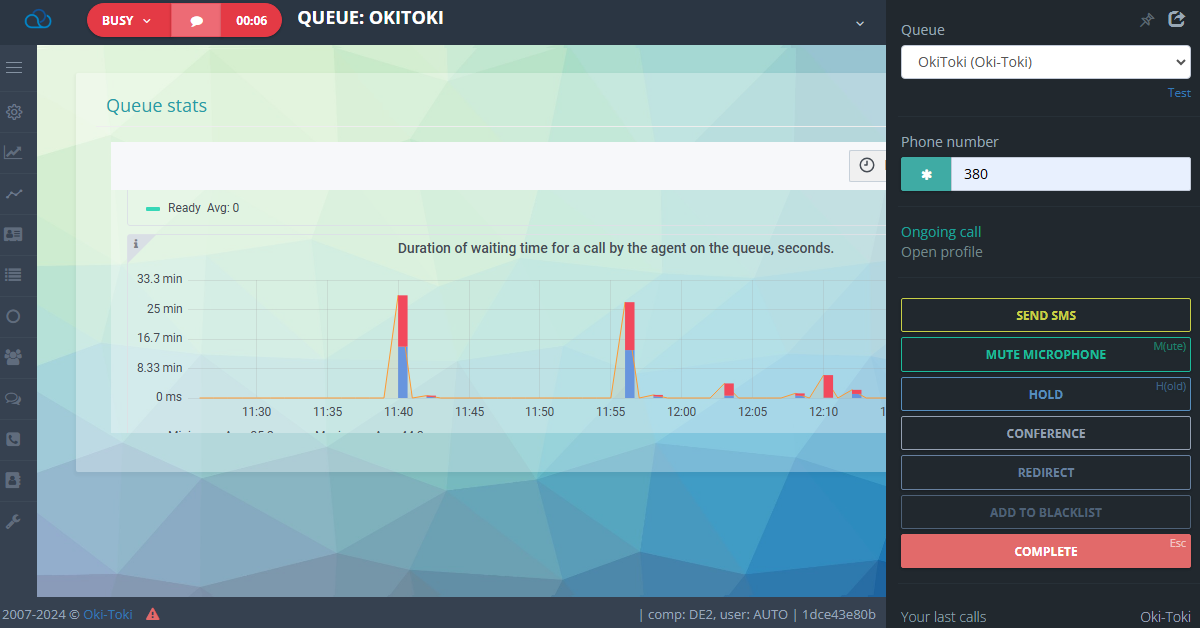
Also, at Oki-Toki, agents can automatically request changes in their work schedules. This is convenient — if anything changes, the agent can submit a request through the system, saving time for them and their supervisors.
More about WFM can be found on the product page.
Why train contact center agents
The agent is the face of the company as they communicate with the customer directly. If an agent knows how to answer questions, solve problems, and find an approach even to the most dissatisfied customer, the customer will be left with a good impression of the company. Preparing contact center agent training helps them to be confident in their actions: they don’t get lost, avoid mistakes, and know how to act in any situation. A well-trained and motivated employee means happy customers and order in work.
How to train call center agents
Training of call center agent employees should begin with understanding what exactly they offer to customers. If they do not know the advantages of the company’s offers, helping the customer will be difficult. For example, if an agent doesn’t know all the nuances of issuing a loan, they won’t be able to interest the client – it’s important to convey all the information and explain the benefit to the customer.
Next, they need to be taught to work with software, to easily navigate and quickly find the necessary functionality. Contact center operator software should be intuitively understandable, to easily find the necessary information. Conduct training on real examples: how to find information about a customer, fill out a CRM form, use a conversation script. In Oki-Toki, the workspace of an agent is arranged so that everything is “at hand” and nothing extra.
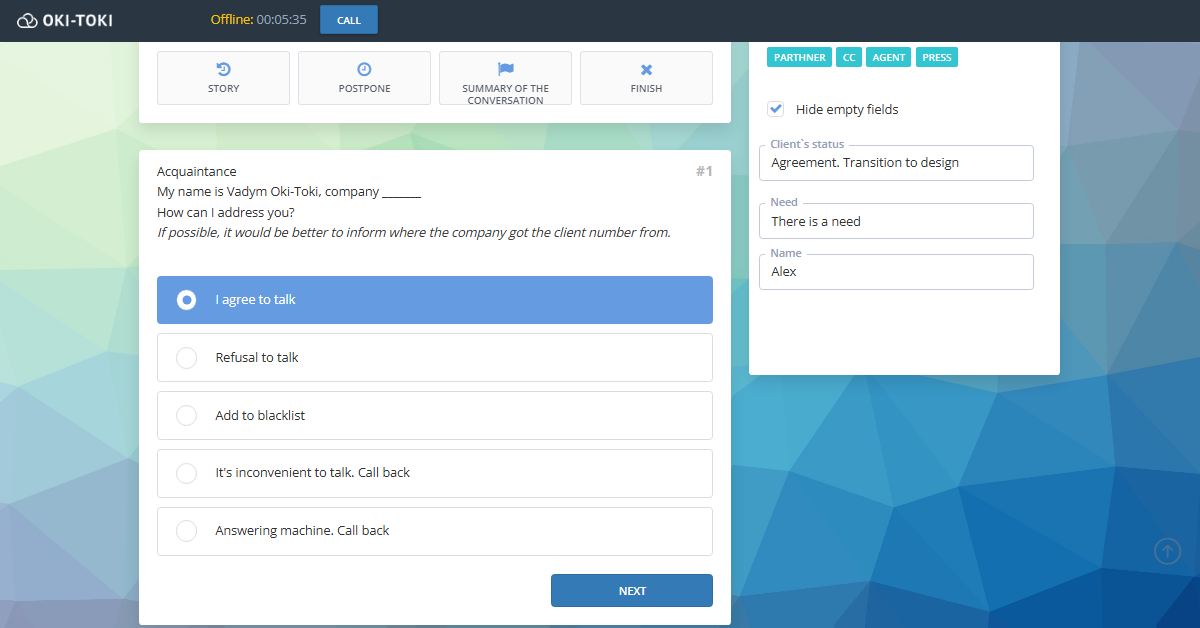
As experience shows, practical training is the most effective way to make agents confident professionals. It’s not just about giving them a text and saying “read”, but showing in practice how to speak with different clients, work with CRM Oki-Toki, track and improve their performance.
About training remote call center employees read in a separate article.
Agent adaptation
To help a new call center agent training program quickly adjust and start bringing real value, you need a smart adaptation plan. Training is not just an introductory course but a whole process that includes various methods and requires ongoing support. Call center training techniques should be flexible and adaptable to the agent’s progress.
The first days of a newcomer are always stressful. Therefore, it is important to assign them a person to whom they can turn for help. An experienced colleague-mentor can not only explain how to perform tasks but also show little tricks that make work easier. For example, how to quickly find common ground with a client or how to find the necessary information in the system in two clicks. With a mentor, it’s easier to cope with difficulties because there is support and answers to questions. This is where call center coaching becomes essential to the agent’s development.
Besides mentorship, it’s useful to arrange quick “storming tasks” sessions when the agent learns to find unconventional solutions under time pressure. For example, organize improvised “objection battles”: agents compete in who can better and quicker deal with a typical customer objection. Such mini-games not only develop skills but also make training more interesting and even fun. These sessions serve as soft skills training for call center agents, helping them build communication and problem-solving abilities in a high-pressure environment.
Don’t forget about “field exercises” — practice on real calls under the mentor’s supervision. The newbie listens to several calls and then conducts a couple of calls themselves, receiving feedback for each. This helps not to be afraid of making a mistake, but to learn directly on the go. These practical exercises are aligned with call center training tips to reinforce real-world application.
Preparing call center representatives training for work should be diverse. In addition to video lessons and webinars, use real analytics. Let newbies see examples of calls from experienced colleagues, analyze what worked and what didn’t. For example, show an excellent case on dealing with an objection and dissect it: what the agent said, why it was right, and what effect it had on the customer.
Regular training, participation in discussions of complex cases, the opportunity to offer their ideas and share experiences — all this helps not only to improve the level of work but also to retain valuable employees in the team. No one wants to be stuck in one place, and the opportunity to develop is the best way to keep professionals. This is an example of how call center leadership training can create a motivating environment where agents feel empowered to grow.
Monitoring the team’s work
In a call center, assessing effectiveness is of great importance. To do this, it’s necessary to conduct regular monitoring of work and carefully control the processes. To understand how agents are working, it’s useful to use different tools and metrics. In Oki-Toki, there are evaluation sheets, reports, reports, and widgets that help identify the strengths and weaknesses of each employee. This is also aligned with contact center training best practices, which emphasize the need for ongoing performance evaluation.
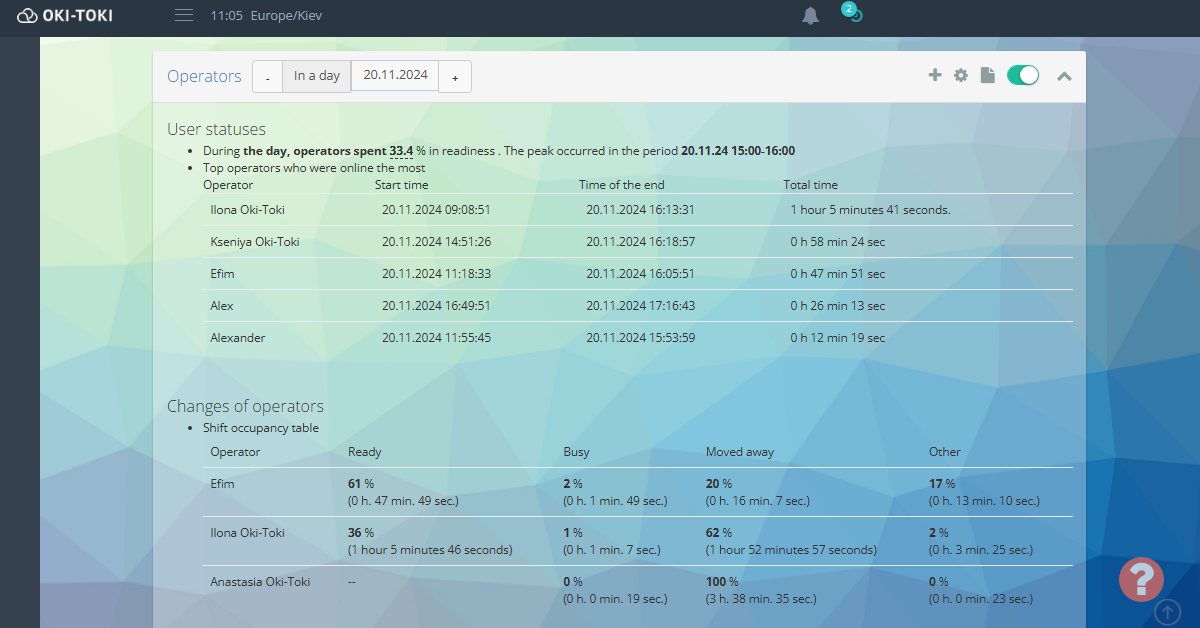
How to organize monitoring of agents’ work
To adequately control agents’ work, use a comprehensive approach. For example, with evaluation sheets, you’ll build a complete picture of each agent’s work.
With reports and reports, you’ll gather statistics on various indicators: the number of processed calls, customer waiting time, speed of query resolution, etc.
And with widgets in Oki-Toki, agents can track their results. For example, using the “Performance” widget, one can see if there were any violations during the shift or, conversely, high speech analytics indicators. By observing their work statistics for the day, an employee can always understand how much time they spent in a particular status and, if necessary, cross-reference their results with the supervisor’s reports.
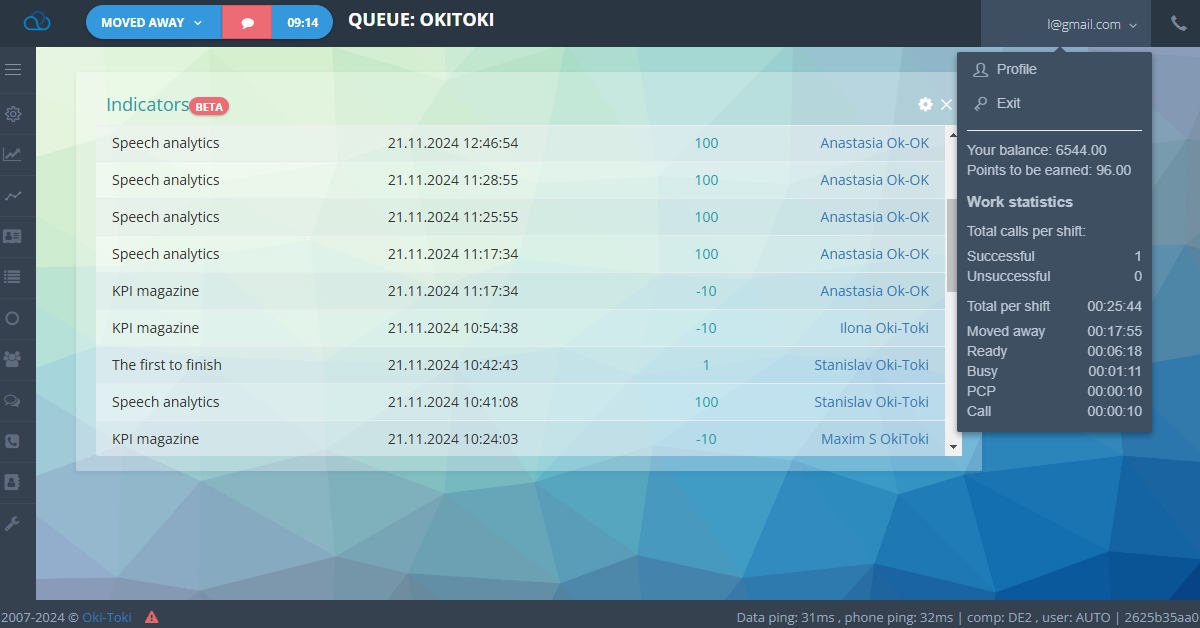
Discuss the results of their work with employees, highlight successes and help cope with difficulties. Such an approach promotes the professional growth of agents and improves the quality of customer service. This kind of virtual call center training approach also allows agents to receive feedback remotely and continuously improve their performance.
How to improve contact center operations and turn a “bad” agent into a “good” one read on our blog.


